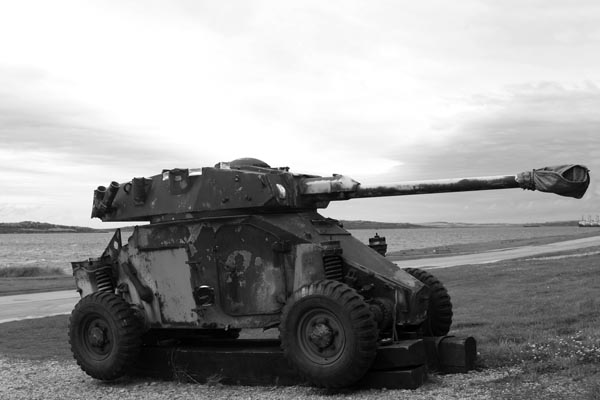Though lying only 300 miles from Argentina and 8,000 miles from Britain, the Falkland Islands remain a remote imperial relic...
The Falkland Islands: a long way from being British
WORKERS, APR 2012 ISSUE
About 3,000 people live in a group of islands in the southwest Atlantic, just above the Antarctic Circle, propped up by Britain. The economy is based on fishing, agriculture (with sheep farming predominant), tourism and latterly oil exploration. The islands are claimed by Argentina, which calls them “las Malvinas”.
It is unclear who first truly discovered the Falkland Islands, though they attracted attention in the 16th and 17th centuries when European powers began their imperial expansion. Spanish navigator and explorer Ferdinand Magellan may have been the first to find the islands on his 1519/21 expedition, though this is disputed. Other sightings of the islands were made by the Portuguese, Dutch and British in the 1500s.
Barren
By the late 1600s Britain and France had re-discovered the barren and still uninhabited islands as their ships were sailing in the area. Britain named them the Falkland Islands while France called them Les Isles Nouvelles or Les Iles Malouines. The Treaty of Utrecht in 1713 ratified Spain’s control over the territories and seas of the Americas.
In 1764 it was France that founded a first settlement at Port Louis, though it made no formal claim. In 1765, a British expedition explored and claimed the islands, and a British settlement was founded at Port Egmont in 1776 introducing cattle, goats, sheep and pigs to the islands. But in 1767, France ceded Port Louis to Spain (which it renamed Puerto Soledad) in exchange for compensation.
Some maintain that as a result Spain occupied and administered the Malvinas from 1767 until Argentinian independence and national liberation from Spain in 1816; others say that Spain only had control over Puerto Soledad. Spain withdrew its governor in 1806 while maintaining its claims. The remaining Spanish-speaking settlers withdrew in 1811, though more arrived from the United Provinces of the River Plate in the 1820s and an Argentine penal settlement in 1832. Even a United States warship arrived in 1831, though nothing permanent ensued.

Rusting hardware, a relic of the 1982 war, beside the road in Port Stanley.
Photo: Tom K!/Shutterstock.com
In 1833 British forces returned to the islands, which became a coaling station for the British navy. From 1840 a permanent British colony was established, and the islands became a strategic point for navigation around Cape Horn for the British Empire. Between 1931 and 1982 neglect saw the population there decline from 2,392 people to 1,800. It’s risen now to 3,000, a number swollen by military garrisons and seekers after possible oil reserves in the waters around the islands.
Argentina says its right to possession of the islands stems from being heirs of the Spanish empire, as well as territorial proximity. Argentina pressed its claim for sovereignty over the islands with renewed vigour in the second half of the 20th century.
Talks between British and Argentine foreign missions took place in the 1960s, but failed to come to a conclusion, mainly because the islanders wanted the islands to remain British territory. But the talks led in 1971 to the islands’ first air link, with a service from Argentina to Stanley, the islands’ capital, (which operated until 1982). Later the Argentine national oil and gas company was given a monopoly over the supply of the islands’ energy needs.
Invasion
On 2 April 1982, Argentina’s military junta, hoping to divert growing internal opposition, ordered their armed forces to invade the Falkland Islands, no doubt encouraged by Britain’s reduction in military capacity in the South Atlantic.
Thatcher’s government sent an expeditionary force to retake the islands, leading to the Falklands War. Fierce naval and air battles and a land campaign resulted in the deaths of 255 British and 649 Argentine soldiers, sailors and airmen, as well as 3 civilian Falklanders – from “friendly” fire. The Argentine forces surrendered on 14 June 1982. By 1981 the Thatcher government had become deeply unpopular, but the chauvinism and phony nationalism of the Falklands War brought her an unlikely khaki election victory in 1983 that allowed her to go ahead with her vicious war against British workers’ jobs, wages and unions.
After the war, Britain increased its military presence on the islands and constructed an airport, RAF Mount Pleasant, as cuts to the navy ruled out a repetition of another naval task force. Although Britain and Argentina resumed diplomatic relations in 1990, no further negotiations on sovereignty have taken place.
A sensible solution
The civilian governments of Argentina continue to assert that the Falkland Islands are Argentinian territory and will not relinquish their claim. Since 1994 it is even part of the Argentine Constitution, with patriotic sentiments enduring rather than ebbing away. In addition, the countries of Latin America have agreed to support a boycott of Falkland-flagged ships in their ports. The possibility of finding oil fields in the area will only be a complicating factor and increase tensions further.
Britain’s government needs to live in the real world and start reflecting the interests of over 60 million people actually living here – not just the nostalgia of 3000 posturing on some far-flung islands. Britain needs to live on amicable terms with Argentina and Latin America, a growing area for trade and development. Britain cannot continue to hide behind the dubious interpretation of the doctrines of “prescription” (that sovereignty of a territory can be established by peaceful occupation over a period of time) and “self-determination”.
In effect, the Falklanders are a small group of introspective pariahs kept afloat by an expensive imperial lifeline. We should jettison this aspect of our colonial past. Negotiations with Argentina could still take place to create transitional arrangements, as we did in Hong Kong, that would protect the ability of the current Falklanders to live and prosper there, if they so wish. ■